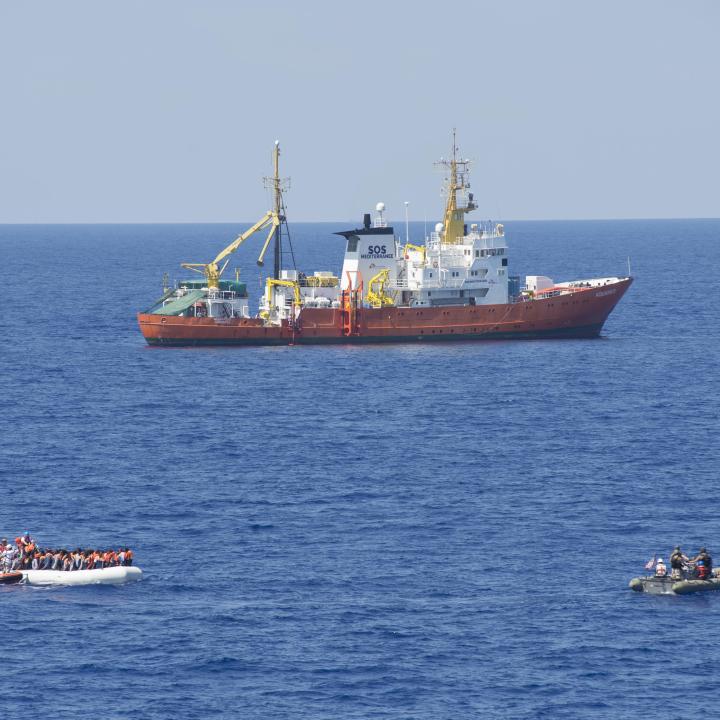
Only by working to address internal issues can the KRI hope to stem the tide of both irregular migration and the loss of its most valuable human capital.
The Mediterranean Sea, once a symbol of trade and prosperity, has become a watery grave for thousands of migrants desperate to escape the harsh realities of their homeland and seek refuge in the West, particularly Europe. The recent capsizing of overcrowded boats, claiming the lives of over 70 people—most of them Kurds—is yet another reminder of the human cost of this ongoing crisis, and highlights the growing trend of Kurdish migration to Europe. While economic hardship undoubtedly plays a role, reducing the Kurdish exodus just to economic factors oversimplifies the deep-rooted issues driving irregular migration from the Kurdistan Region of Iraq (KRI), which are fueled by a confluence of economic, social, and political factors that demand a nuanced understanding.
As a Kurdish refugee myself, having arrived in the United Kingdom under Tony Blair’s government seeking political refuge from the turmoil that had engulfed our homeland, I know firsthand the disorientation and fear of starting anew in a foreign land. My childhood memories of the KRI are fragmented, like scenes from a forgotten film—glimpses of joy and laughter amidst the ever-present shadow of conflict. These fragments, both pleasant and unpleasant, are etched into my being, shaping the person I am today.
The local community center in the UK became a lifeline, offering mandatory language classes that were not only essential for our integration but also a place of networking. There, we met other families who, like us, had sought refuge in Great Britain. We shared stories, anxieties, and dreams, forging bonds that transcended language barriers. With the resilience and adaptability of childhood, I gradually found my footing in this new land. The community embraced us, and slowly but surely, the UK transformed from a strange and unfamiliar place into a cherished home.
This personal journey has instilled in me a deep empathy for those who are forced to leave everything behind in search of safety and a better life. I firmly believe that no one would willingly abandon the comfort and familiarity of their homeland unless driven by desperation or lured by unrealistic expectations. The decision to migrate is often a last resort, a desperate gamble for a future free from fear and despair.
Although official statistics on irregular migration from the Kurdistan Region of Iraq (KRI) are lacking, various media outlets have reported on the issue. Rudaw Media estimates that around 20,000 individuals migrated from Iraq and the KRI in 2023. Meanwhile, the Center for Middle Eastern Studies suggests a higher annual average of 32,000 people leaving the KRI through irregular channels since 2020, accumulating to approximately 96,000 over three years. Notably, the Summit (Lutka) Foundation for Refugees and Displaced Affairs reports a staggering figure of over 760,000 people who have migrated from Iraq and the KRI since 2015.
This discrepancy in figures highlights the difficulty in accurately quantifying irregular migration due to the often clandestine nature of these journeys. However, the reports collectively underscore a substantial outflow of people from the region, driven by a complex interplay of economic, social, and political factors.
Economic factors, particularly high youth unemployment, significantly contribute to the migration crisis. Uncertainty stemming from a volatile political landscape and a lack of job security all contribute to the underlying causes of irregular migration.
Rising inequality in the KRI has fueled economic grievances, where personal connections and family ties often secure jobs and investments for young entrepreneurs, leaving those without such advantages feeling hopeless. This has fostered small, powerful groups while simultaneously creating a sense of hopelessness among those who don’t have such advantages. Individuals feel they must either align themselves with the ruling political parties to succeed or risk being left behind, regardless of their hopes, aspirations, or potential. This unequal system breeds resentment and creates a toxic environment for young people and families.
Beyond perceived corruption and lack of accountability, the internal dynamics driving irregular migration also include underinvestment in at-risk communities. Smugglers exploit the disillusionment of these families, painting an unrealistic picture of life in the West. Many believe that healthcare, housing, education, and financial allowances are guaranteed upon arrival, but the reality often falls far short of these expectations.
European nations, particularly the UK, have a significant role to play in addressing irregular migration through proactive and targeted measures. Investing in the economic development of vulnerable areas, such as Raniya—a town that has witnessed a disproportionate exodus of its young population to Europe—is a crucial step. By creating jobs and opportunities within these communities, we can address the root causes of desperation that drive individuals to risk their lives on dangerous journeys.
By integrating economic investment in at-risk communities, establishing and expanding legal pathways for migration, utilizing research-driven solutions to understand and address root causes, and fostering meaningful community engagement in both origin and destination countries, we can find a sustainable and comprehensive approach to irregular migration.
However, it is imperative to acknowledge that addressing irregular migration requires more than just reactive measures. Investing in research to comprehensively understand the complex factors that drive these flows is essential for developing effective long-term solutions. While cracking down on smuggling networks is a vital component, it is not a panacea. Collaborating with local media platforms to raise awareness about the harsh realities and dangers of illegal migration can also serve as a powerful deterrent.
Partnering with local media platforms is crucial to engage and highlight the dangerous reality of illegal migration. By disseminating accurate information and raising awareness about the precarious housing conditions and numerous hardships faced by migrants in the UK and other European countries, we can help potential migrants make informed decisions and deter them from embarking on perilous journeys based on false promises.
Moreover, the inherent human desire to travel and explore the world is stifled by the stark reality of possessing one of the world’s weakest passports. According to global passport rankings, obtaining a visa for citizens from Iraq is an insurmountable process. This begs the question: could easier visa access provide a legitimate avenue for young people to experience Western cultures firsthand, without resorting to dangerous, illegal migration routes?
The idea of short-term travel visas as a potential solution could be a significant and important step to ameliorate the angst and desperation of disaffected youth. By offering young people the opportunity to explore the world legally and safely, it could potentially alleviate some of the desperation driving them towards irregular migration. This is not to suggest that visa liberalization alone would solve the complex issue of illegal migration; however, it would acknowledge and address the legitimate desire for travel and cultural exchange that exists within the region’s youth. By removing the stigma associated with their passports and enabling legal travel, we might foster a greater sense of connection and understanding between the West and the KRI, ultimately contributing to a more stable and prosperous future for all.
Furthermore, establishing legal migration pathways can provide a glimmer of hope and a viable alternative for those who might otherwise resort to perilous methods. These pathways can be tailored to the specific needs and skills of the population, ensuring a mutually beneficial exchange between the receiving countries and the individuals seeking a better life.
This issue extends beyond irregular migration. The KRI is experiencing a significant “brain drain,” with highly skilled workers opting to leave despite the economic challenges present in the West. They are drawn to the security, stability, and rule of law offered by democratic Western countries—elements that are often lacking in their homeland. This exodus of talent further weakens the region’s economic prospects and exacerbates the underlying problems driving migration.
Therefore, both collaboration with Kurdish authorities and holding them accountable for counterproductive policies are essential, especially when it comes to addressing the conditions that are increasingly compelling their citizens to seek opportunities elsewhere. Only by working to change these internal issues can the KRI hope to stem the tide of both irregular migration and the loss of its most valuable human capital.

